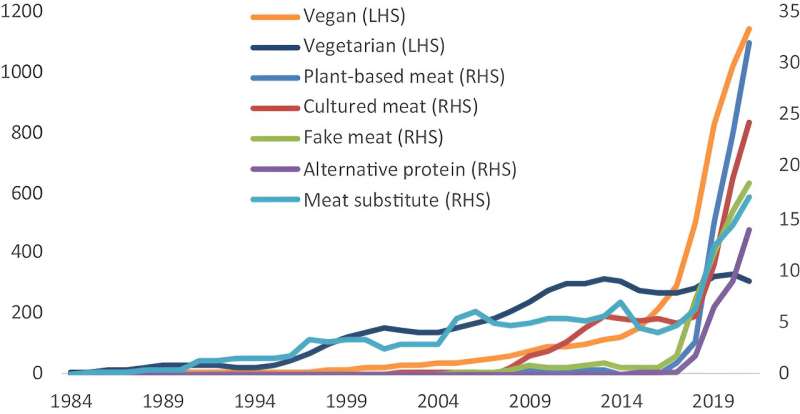This article has been reviewed according to Science X's editorial process and policies. Editors have highlighted the following attributes while ensuring the content's credibility:
fact-checked
peer-reviewed publication
trusted source
proofread
Sustainable food production and consumption: Exploring the transition to alternative proteins

Animal agriculture is responsible for considerable environmental burden, and a key contributor to climate change. Meat alternatives are increasingly understood as potential solutions to decreasing this burden by enabling a shift away from conventional models of production and consumption of animal-derived foods.
In a paper written by Josephine Mylan and John Andrews and published in the Proceedings of the National Academy of Sciences, they explore the progress, drivers, and barriers of change by examining the development and diffusion of four key technologies used to produce "alternative protein" products.
Recent developments are shown to be consistent with an emerging sustainability transition, particularly the increased engagement with alternative proteins by large food corporates. However, political, regulatory, and cultural barriers remain, and are more pronounced for some alternative protein technologies than others, affecting prospects for the progression of a transformational "protein transition."
A widespread sense of the unsustainability of the food system has taken hold in recent years, leading to calls for fundamental change. The role of animal agriculture is central to many of these debates, leading to interest in the possibility of a "protein transition," whereby the production and consumption of animal-derived foods is replaced with plant-based substitutes or "alternative proteins." Despite the potential sustainability implications of this transition, the developmental trajectories and transformative potential of the associated technologies remain underexplored.
This article sheds light on these dynamics by addressing two questions: 1) how have alternative protein innovations developed over the past three decades, and 2) what explains their more recent acceleration? To answer these questions, the article makes an empirical analysis of four alternative protein innovations, and the partial destabilization of the animal agriculture system between 1990 and 2021, guided by the multilevel perspective.
The analysis highlights an intensification in corporate engagement with alternative protein development and diffusion. This intensification is judged to be consistent with the beginnings of a wider corporate reorientation, occurring alongside a rise in pressures on the animal agriculture system, notably an increasing scientific consensus and societal awareness of the links between climate change and meat-intensive diets.
The paper demonstrates how differences in technological maturity across the niche innovations have resulted in potentially transformative pressures, which are consistent with an emerging sustainability transition, manifesting differently in terms of the extent of diffusion of the alternative protein niches.
More information: Josephine Mylan et al, The big business of sustainable food production and consumption: Exploring the transition to alternative proteins, Proceedings of the National Academy of Sciences (2023). DOI: 10.1073/pnas.2207782120
Journal information: Proceedings of the National Academy of Sciences
Provided by University of Manchester





















